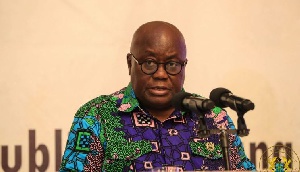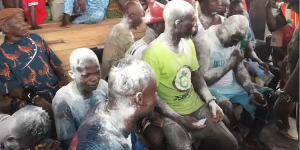I can’t speak French to save my life. I have A level in French. I can just about read and understand written French.
I am not quite sure how I would fare currently, but it used to be that after about the third day in a French-speaking country, I could follow the conversation and the news on radio and television.
But when it comes to speaking the language, I have a total mental incapacity.
It is with this background that I have approached with trepidation the news that Ghana is now a full Francophonie member.
I don’t know how many Ghanaians are actually aware of this dramatic change in our status, or if they care for that matter.
A few weeks back, the President of the Republic, Nana Addo Dankwa Akufo-Addo, attended a meeting of the Francophonie and we were told that Ghana had moved from being an associate member of the organisation to full membership.
With Nana Akufo-Addo as our President, I suspect this shouldn’t be a surprise.
He is a francophonie with all the implications of that word, he is fluent in French and he was Foreign Minister when President J.A. Kufuor took Ghana into the organisation.
It would be expected, therefore, that he would want to upgrade our standing within the organisation.
Francophonie neighbours
It is true Ghana is surrounded by francophonie neighbours, Cote d’Ivoire to the west, Burkina Faso to the north and Togo to the east of us.
It is true that those of us who live near the borders do our best to ignore the artificially imposed lines on our people and go back and forth as one would if your kitchen is in Togo and your bedroom is in Ghana.
This is best exemplified by the chief in one of the border towns who expressed his frustration at the accusations of non-Ghanaians voting in our elections by pointing to a cluster of houses a few metres across his garden and making the point that even though the international border put them in a different country, the people in those houses were his subjects and would always vote in elections in his country.
It is also true that we all tend to cling to and exhibit the habits of our colonisers far more than we would admit to.
Thus, our francophonie neighbours would think of and quote Voltaire and we would instinctively quote Wordsworth.
But it is not London or Paris that divides us the most. The deepest divisions are caused by how we define ourselves along the lines of who colonised us, but that is another story.
Adjustment
At the moment, I am trying to work out how Ghana is going to adjust to being a full member of Francophonie when most of us have the British disease of expecting everybody to be able to speak English and we don’t make any attempt to speak other people’s language.
I started this piece by stating that I can’t speak French to save my life; and this after I had studied French in school and actually got certificates to show for it.
In all our three neighbouring countries, everyone who has been to secondary school is able to make her way in English.
I have an unpopular view about the source of the problem with French in Ghana.
I know it is an unpopular view because I stated it at a meeting of an Association of French Teachers and it was not well received.
I believe there is a problem with how French is taught in this country.
Like the Mathematics teachers, the French teachers seem to think that theirs is a “difficult subject” which can only be mastered by children endowed with Einstein-like brains.
It goes without saying that the teachers themselves would be assumed to be similarly endowed.
The teachers seem to believe that only very bright children would be able to take the subject and pass the exams.
Some of them seem to take perverse joy in the fact that the subject they teach is not popular with many students and there are very few grade “A”s and first classes.
This ensures that the subject continues to be viewed as a “difficult” one that only a small and exclusive group can take.
I do have another theory about the difficulty we have with popularising French in this country. I have tried the theory on a former French Ambassador. He did not reject it entirely.
The theory goes like this: Whereas the French insist on their language being spoken “correctly” and according to the rules of the Academie Francaise, the English are more tolerant towards non-native English speakers like us messing with their language.
You can see the Frenchman cringing as you struggle to speak your “School French”.
The Englishman, on the other hand, does not seem to mind that we treat his language without any reverence.
The French, with their “correct French” attitude, put extra pressure on the would-be French speakers.
Every time I go to any police or military barracks, I am reassured that Ghanaians do not have any cultural or biological reasons not to be able to cope with French. Just watch any “Barracks child” and take note of how many languages he speaks.
Just go amongst the children on the streets and you hear them speaking three or four Ghanaian languages and enough English to take them through a normal difficult day.
We send the same child to school and she tries to do French, and she is stuck. And yet French is no more, or should be no more difficult to learn than Hausa, nor Twi nor Ga, and even though some disagree with me, nor Ewe.
Which is all a very roundabout way of stating that if President Akufo-Addo is making Ghana a Francophonie country, he would have to have a word with the French teachers, he would have to have a word with the French Ambassador and encourage him to brace up for “incorrect and bad French”.
Widely spoken
I read that in a few years’ time French would be the most widely spoken language in the world and the majority of the speakers would be from Africa.
I suspect that this idea of a rarefied and pristine French language as was once spoken by the likes of Leopold Senghor has long disappeared.
I suspect that with a little encouragement, our own street French can soon emerge.
I have no doubts at all that there are many opportunities in Cote d’Ivoire, Burkina Faso and Togo that many of our young professionals don’t consider simply because of the language barrier.
I cannot believe that the French spoken at Kpalime, which is only a few miles from Holunta in my Ho West constituency, would be any more posh than the English spoken at Abutia.
We don’t even have to aim at President Akufo-Addo’s French.
He has a thing about speaking a language as it is spoken by the native speakers. Very few of us aim at his very posh English.
We can be francophonie without being on the level that would pass muster with the Academie Francaise.
It is not often I encourage a dilution of the real thing.
On this occasion, I am ready to vote for it, in the hope we would finally accept we are surrounded by French speakers.
And the concept of having A level French and not being able to speak it, would disappear.
Opinions of Wednesday, 7 November 2018
Columnist: Elizabeth Ohene















